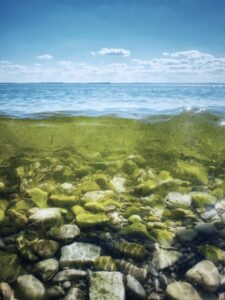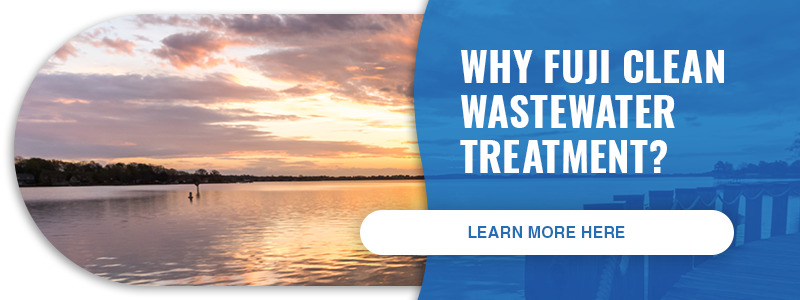
Nitrogen is a naturally occurring chemical; it is found in our water, soil, air, and even in our DNA. Without nitrogen, plants would not be able to grow as efficiently and would produce smaller fruits and flowers; we wouldn’t be able to breathe! However, there is a delicate balance between having too little nitrogen and having too much.
Nitrogen in Our Wastewater
Water, soil, and air are all sources of nitrogen, but human waste, food, and certain soaps and detergents are also sources of nitrogen. After water is used in homes and businesses, it flows away from the property into a city sewage system or into a septic tank. When on-site septic systems aren’t functioning properly or are simply inefficient, nitrogen in the water won’t be treated as thoroughly and will eventually seep into the groundwater. This can begin a cycle of harmful effects.
Eutrophication
When nitrogen is not efficiently removed from the water, it can lead to a buildup of nitrogen. Excess nitrogen can lead to a process called eutrophication, which is when there is excessive growth of plants and algae. Algae blooms can cause a lake to turn green, which is caused by phytoplankton in the water.
 Algae Impacts Oxygen in Water
Algae Impacts Oxygen in Water
As the green phytoplankton die, the decomposition process reduces the amount of oxygen in the water. As you can imagine, not enough oxygen in the water can cause a variety of issues. Not enough oxygen in the water can produce a “dead zone,” where plants and animals can’t survive. In coastal areas, where marine life, birds, and amphibians are abundant, the health of the water can significantly impact their environment.
Treating Nitrogen at the Source
According to the EPA, “approximately 20 percent of homes in the United States use septic systems.” These tanks treat wastewater that flows away from homes and businesses, but they are not always managed properly or function as they should. Septic system failures are a significant cause of excess nitrogen in the groundwater, which lead to nitrogen in nearby streams, rivers, lakes, and oceans.
Advanced Wastewater Solutions Installs Fuji Clean Wastewater Treatment Systems
Throughout Suffolk County, New York, homes and businesses still rely on outdated on-site septic tank systems or cesspools. These systems leave behind a significant amount of nitrogen, which seeps into the groundwater, and greatly affects the local water environment and animal habitats.
The Fuji Clean wastewater treatment system contains five chambers (sedimentation, anaerobic, aeration, storage, and disinfection), making it the best overall nitrogen reduction system. Treating nitrogen more efficiently at its source can help create a more healthy environment for plant and animal life in the surrounding areas.
AWS is passionate about protecting the Long Island environment and helping to maintain a healthy lifestyle for residents and their families. Our team is made up of certified Fuji Clean technicians, and we can help home and business owners select a tank that is best for their property, we can install the tanks, and we provide long-term maintenance of the system to ensure that it is functioning properly. Follow the links below to learn more about our mission, and contact us today if you’re interested in upgrading your septic tank to a Fuji Clean wastewater treatment system.

What Advanced Wastewater Solutions Does
Why Install a Fuji Clean?
Save the Bays Initiative
City Grants and Rebates to Help Cover Installation/Upgrade Costs


